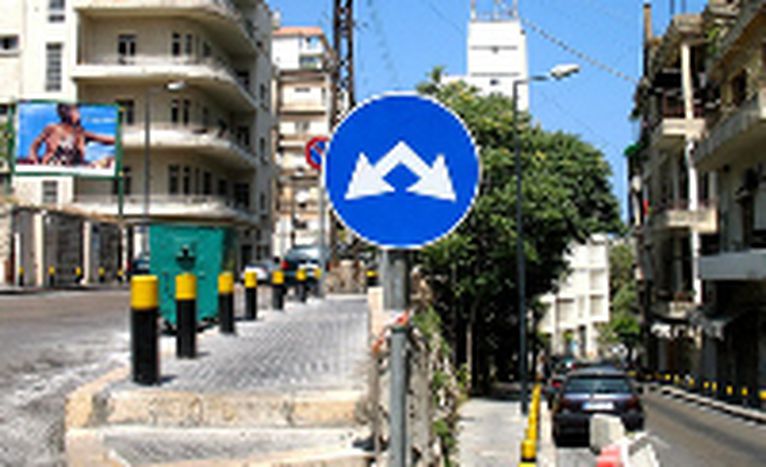
The Lebanese press treads the mined path to freedom
Published on
Translation by:
Francesca ReinhardtSince the withdrawal of Syrian troops, Lebanon is beginning to open up. Journalists have never enjoyed such freedom but often pay a bloody price for their independence.
Beirut, September 25th 2005. May Chidiac, the host of the popular morning show Naharkom Sa’id (“Good Morning,”) leaves the building of the television broadcaster LBCI in the afternoon and gets into her car. She plans to drive home. Seconds later, a car bomb explodes under her vehicle.
She loses her left arm and leg in the attack.
The Lebanese public is shocked. However, the attack on May Chidiac is not an isolated incident. The television presenter is one of three prominent journalists killed or seriously injured in Lebanon within the last year. The growing conflict in the country is being carried out, above all, in newspapers and on television screens – and journalists are often the victims.
Unlike the civil war which raged from 1975 to 1990, the conflict in Lebanon is no longer between Christians and Muslims. The fault line now runs between Shiites and Sunnis. The Sunni camp is fighting to make Lebanon open to the world and to escape the influence of Syria. The Shiites, led by groups such as Hizbullah, want to establish a strategic alliance with Syria.
After the murder of former Prime Minister Rafik Hariri in February 2005, Syria withdrew its troops from Lebanon under pressure from the international community. Since then, Lebanon has reoriented itself – and even in the media industry, the balance of power is shifting. Experts and journalists speak of progress and growing press freedom. However, as the case of Chidiac shows, these developments come at a cost.
Media politics and assassinations
“At first glance, many observers think that the problems here have to do with religious conflicts. In fact, it is a struggle for political power. The same goes for the media,” says Jim Quilty. With a PhD in Middle Eastern history, Quilty came to Beirut from Canada in 1998. Since then, he has written for the politics and culture sections of The Daily Star and The Middle East International Magazine – both English language newspapers.
Jim Quilty knows that in the complex conflicts of the Middle East, journalists quickly come in the line of fire. “The media is completely politicised. There is, of course, a range of different newspapers and broadcasters. However, all of them have an underlying political position. And if, as a journalist, you openly express anti-Syrian sentiments, you can find yourself in a lot of trouble.”
As was the case with Gibran Tueni. The publisher of the liberal Arabic language newspaper, Al-Nahar, fell victim to a car bomb on December 12th 2005. The previous June, the Al-Nahar columnist Samir Kassir met the same fate. Tueni and Kassir were major critics of Syria’s Lebanon policy and of the presence of Syrian forces in their beloved land of cedars. The murders of both journalists remain unresolved.
Three steps forward, two steps back
Following the series of attacks on journalists, Lebanon slipped from 87th to 108th place in the rankings of the Reporters Without Borders 2005 report. Nevertheless, many journalists believe that the situation has greatly improved since the withdrawal of Syrian troops. Television broadcasters, such as Future TV, can show reality shows similar to those in the West. Moreover, divorced from Syria, Lebanon is developing as a multi-faith model state in the Middle East.
“What has developed here over the past year is not quite a revolution, but greater independence,” says Jim Quilty. Since the assassination of Hariri, the Lebanese press has increasingly dared to publish editorials and proclaim its resentment towards neighbouring Syria. Quilty explains that “the bomb attacks on journalists occur in the context of the conflict between Lebanon and Syria; it is an indication that editors have been feeling confident enough to take their opinions public.”
Dismantling the Syrian security apparatus
Opinion pieces and unrestricted programming have existed in Lebanon since the dismantling of Lebanon’s General Security. The special branch of the Ministry of the Interior was off-limits according to media censors until 2005. At the discretion of the security forces, criticism of Syria and nonconformist publications were blocked, and journalists systematically followed.
The Lebanese film maker and Berlin resident, Myrna Maakaron, makes the comparison that “the General Security controlled things in Lebanon the way the Stasi did in the DDR. At the top of the pyramid were Syrian agents.” In addition to direct censorship, the security forces undertook silencing and intimidation of journalists. For the moment, the state-sponsored terror is over and officials are being held to account. Indeed, the former director general of internal security in Lebanon Jamil Al-Sayyed has been under investigation since August for his role in planning the assassination of Hariri.
Although the U.S.-proclaimed “Cedar Revolution” has not resulted in revolutionary reforms, some journalists and film makers, such as Myrna Maakaron, see positive developments. “The President is still pro-Syrian and there is a lot of censorship. But there are more and more politicians and journalists who express themselves freely and write what they think. Even in the new political climate, they know that their lives are at risk.”
May Chidiac, for one, will not be discouraged. Although the attack has crippled her, she is eager to get back on the screen as soon as possible to continue presenting her show. On May 3rd she was awarded the Guillermo Cano Prize for Press Freedom by UNESCO for her contributions in Lebanon.
Translated from Libanon: Zwischen Attentaten und Aufbruchstimmung



